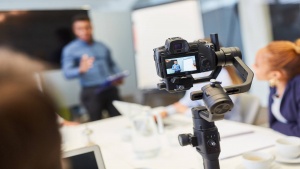One of the indicators of a workshop’s or conference’s success is the degree of engagement from its attendees. Low levels of participation suggest that your audience wasn’t paying attention, and, hence, may have failed to fully absorb the information you presented.
There’s no denying that a large portion of most people’s time at a workshop or conference will be spent listening rather than doing anything productive. In contrast, the most successful events are those that pay close attention to the attendees and work to improve their experience as much as possible.
The ideal approaches to increase the quality of such types of events will be explored here, ranging from incorporating entertainment to using cutting-edge technological solutions.

1. Choose A Presentation Format That Suits Your Audience Needs
The business world has learned that virtual and hybrid events can be fun and exciting, and the same is true for workshops and conferences. It’s possible that a fully online version of such affairs might be more effective.
If you want to engage those who can’t make it to the session in person, a hybrid approach is a good option. However, in-the-flesh sessions, especially if they’re smaller and more personal, can also be a viable choice for your target demographic.
The needs of your audience will determine the best presentation style. Also, keep in mind that the event’s technology requirements will vary depending on whether the event is hybrid, virtual, or in-person.
2.Set Aside A Few Minutes For A Quick Icebreaker
Start the event on the right foot by engaging in some exercises. Aside from making people laugh and think, such activities also put them in the right mood, encouraging them to contribute their own creative input.
The time invested in these quick exercises is certainly worth it. Remote team-building activities or business discussions can be more productive when participants feel comfortable talking to one another and sharing their ideas.
Icebreakers are like a magical on/off switch, igniting everyone’s imagination and encouraging them to work together. Any meeting, call, or brainstorming session will be met with increased energy and passion after a brief 15-minute game has been completed.
3.Use The Right Technology
Participating in a workshop or conference session allows you to meet new people and discuss topics of mutual interest. Thus, no matter where you hold your event, you’ll need a space that’s conducive to effective communication and group work. So, make sure the venue is equipped with all the right tools and equipment.
Incorporate smart and interactive whiteboards, a reliable Wi-Fi connection, mobile event apps, large screen projectors, video conferencing hardware, and screen-sharing software, among others. Having these technological tools in place ensures you have the optimal and most effective setup possible.
Before the session begins, do a brief run-through and make sure everything is working.
4.Hold A Demo
Have a product demo at your next conference or workshop to show attendees how the item might benefit them. Demonstrating your product to an audience won’t only increase their familiarity with it, but it’ll also pique their interest. You should have knowledgeable and competent representatives available to answer inquiries about your product.
A four-to-eight-step interactive demo is ideal. A video demonstration should last one up to four minutes. To prevent boredom or overwhelming the audience, keep the discussions brief and simple.
5.Take Advantage Of Social Media
If you’re selling or launching a new product or service, try integrating your corporate events with your other marketing tactics, such as social media campaigns.
Knowledge of social media platforms isn’t only useful for getting the word out about your event, but also for increasing excitement and participation in the event itself.
Make the workshop or conference more engaging by allowing the audience to ask questions in real time, providing rewards and incentives for sharing information or hashtags, conducting polls, and many more.
You can also create an online event, like in social media groups or online communities, so you can connect with one another before, during, and after the event.
6.Don’t Forget About Post-Event Strategies
In order to keep event attendees engaged, it’s important to keep the conversation going long after the event has ended.
Following up with your attendees can be done in different ways, including the following:
- Write Thank You Emails. Sending thank you emails is a good way to maintain communication with attendees long after the event has ended. Write emails to the individuals you spoke with, expressing your gratitude for the opportunity to get to know them and their objectives. Just make sure to make every email specific and relevant to the recipient.
- Send Out Post-Event Surveys. The best way to get feedback from attendees is to send out survey forms after the event and ask them what they think of it.
These questions can be asked after the event has ended, helping improve the quality of future conferences:
- Did you find this session informative?
- Is there anything you want to change about the conference?
7.Conclusion
There’s a wide variety of possibilities available for those looking for ideal business workshop and conference event ideas. Quite a few are convenient because they can be held in different settings or conducted online.
Remember to be creative if you want to stand out in a competitive market and leave an everlasting impression on your clients and employees.


